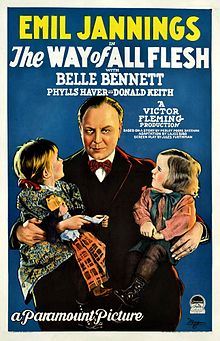The Way of All Flesh (1927 film)
| The Way of All Flesh | |
|---|---|

Film poster
|
|
| Directed by | Victor Fleming |
| Produced by |
Adolph Zukor Jesse L. Lasky |
| Written by |
Perley Poore Sheehan (original story) Lajos Biro (adaptation) Frederica Sagor (adaptation) Jules Furthman (scenario) |
| Starring | Emil Jannings |
| Cinematography | Victor Milner |
| Distributed by | Paramount Pictures |
|
Release date
|
|
|
Running time
|
9 reels; 8,486 feet |
| Country | United States |
| Language |
Silent English intertitles |
The Way of All Flesh is a 1927 American silent drama film directed by Victor Fleming, written by Lajos Bíró, Jules Furthman and Julian Johnson from a story by Perley Poore Sheehan. The film is unrelated to Samuel Butler's novel The Way of All Flesh, and is now considered a lost film.
In the story, which opens in the early 1900s, Jannings plays August Schiller, a bank clerk in Milwaukee who is happy with both his job and his family. But when bank officials ask him to transport $1,000 in securities to Chicago, he meets a blond seductress on the train, who sees what he is carrying. She flirts with him, convinces him to buy her a bottle of champagne, and takes him to a saloon run by a crook. The next morning he awakes alone in a dilapidated bedroom, without the securities. He finds the woman, and at first pleads with her, then intimidates her to return the stolen securities. He is knocked unconscious by the saloon owner and dragged to a nearby railroad track.
As the crook strips him of everything that might lead to his identification, Schiller recovers consciousness, and in a struggle the crook is thrown into the path of an oncoming train and killed. Schiller flees, and in despair is about to take his own life, when he sees in a newspaper that he is supposedly dead, the crook's mangled body having been identified as Schiller's. The time passes to twenty years later. Schiller is aged and unkempt, employed to pick up trash in a park. He sees his own family go to a cemetery and place a wreath on his grave. Following other scenes in a Christmas snowstorm, Schiller makes his way to his former home, where he sees that the son whom he had taught to play violin is now a successful musician. He walks away, carrying in his pocket a dollar that his son has given him, not recognizing that the old tramp is his father.
The film is a melodrama starring Emil Jannings, Belle Bennett, and Phyllis Haver. Jannings won the first Academy Award for Best Actor in a Leading Role for his performance in this film and his performance in The Last Command (the only year that acting Oscars were awarded for multiple performances).
...
Wikipedia
